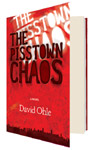CENTRAL QUESTION:
Are peace and prosperity the seeds of chaos?
When Motorman (1972), David Ohle’s surpassingly weird first novel, was brought back into print four years ago to coincide with a long-awaited sequel, The Age of Sinatra, acolytes appeared from the blue, professing devotion (“awesomely carving deep, black holes into the edifice of the English language” was how Ben Marcus described the book) as if they’d been waiting all their lives to testify. Because, as another author/fan, Gabe Hudson, remarked, it wasn’t a cult Ohle had generated; it was a sleeper cell.
With the publication of The Pisstown Chaos, Ohle’s siren call has rung again. His third novel takes place in the same menacing cartoon of a dystopia as his earlier books, which means that its chronological relation to those books is also kind of fuzzy. Time has never had much purchase in Ohleland. Although some folks can still recall when “Kenny” was president and when “Arvey” assassinated him, at some point—in ’64 to be precise—something called the Great Forgetting officially expunged the nation’s collective memory. And as for Moldenke, the stoic everyman who persevered through all the gross-out iniquities Motorman and The Age of Sinatra could throw at him (including a surgery to implant four sheeps’ hearts), he’s no anchor for the reader. Moldenke makes only cameo appearances in The Pisstown Chaos, as a touring performance artist.
These days, Moldenke and his countrymen live in a theocracy under the Reverend Herman Hooker. Determined to limit the spread of a parasite that turns its human hosts (Moldenke included) into odoriferous “stinkers,” Hooker has instituted a national program of enforced “shiftings,” dividing up families seemingly at random, and relocating them to trailers, shantytowns, prisons, and labor camps. Among those ordered to abandon their homes and assume far-flung bureaucratic assignments are the hapless protagonists of The Pisstown Chaos, wealthy widow Mildred Balls and her grandchildren, Ophelia and Roe.
Yet, as usual, it is Ohle’s topsy-turvy mise-en-scène that’s the real main character. Like his precursor Beckett, Ohle knows just how funny, and also how frightening, a world without memory is (“Stars? Moon? I don’t know. I never looked up much”). Each of the novel’s twelve chapters opens with excerpts from the City Moon newspaper, and Ohle’s exquisitely rendered journalese is awesome in its deadpan illogic: “Moldenke, the touring stinker, has filed a deed to purchase certain properties in the afterworld. Local legals say the properties do not exist. Moldenke says they do, at the edge of the city, and that he has seen them as recently as two nights ago.”
Ohle has lived in Kansas for decades, but he has always identified himself at the backs of his books, presumably with pride, as a “native of New Orleans.” And so in this macabre novel of a people dispossessed, written in what for him must have been an unprecedented hurry (thirty-two years passed between Motorman and The Age of Sinatra), it is difficult not to spot the imagery of Hurricane Katrina. Still, Ohle didn’t dig those black holes with mere political allegory. Or by writing politely. No amount of description will prepare you for the icky, cavernous, taboo places in your mind to which he’ll lead you, hand in hand, Virgil to your Dante. You’ll recognize some of these places, of course. The question is, how did he get in there?
Format: 196 pp., paperback; Size: 5″ x 8″; Price: $14.95; Publisher: Soft Skull Press; Editor: Anne Horowitz; Cover design: Shane Luitjens; Print run: 2,000; David Ohle did not: transcribe Burroughs’s dreams (but he did work for him and his estate); Gordon Lish did not edit: Ohle’s first book, Motorman (but he did publish Ohle in Esquire); Representative sentence:“ A stinker using a bow and arrow bagged a wild imp today in front of the Radiola Theater in full view of horrified patrons, who watched him dress it with surgical precision, cube and salt the meat, wrap it in burlap and run north, leaving behind a mound of gristle and bone.”





